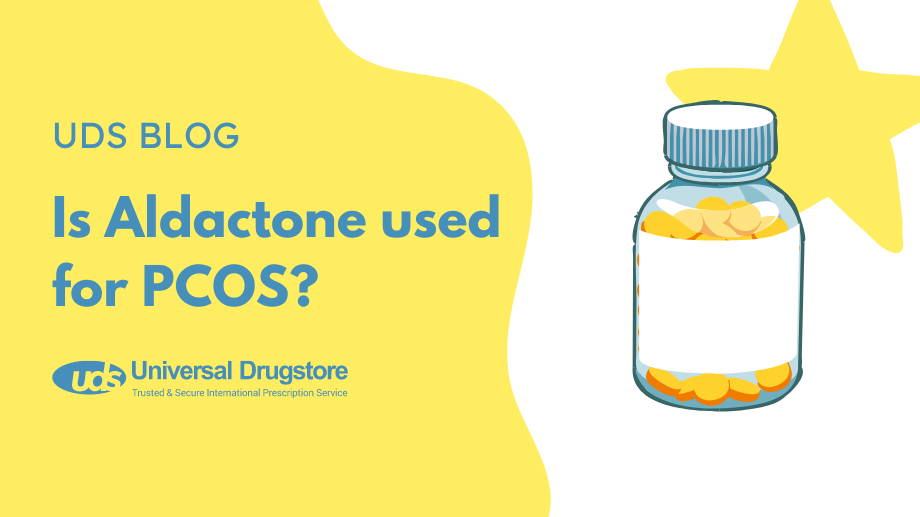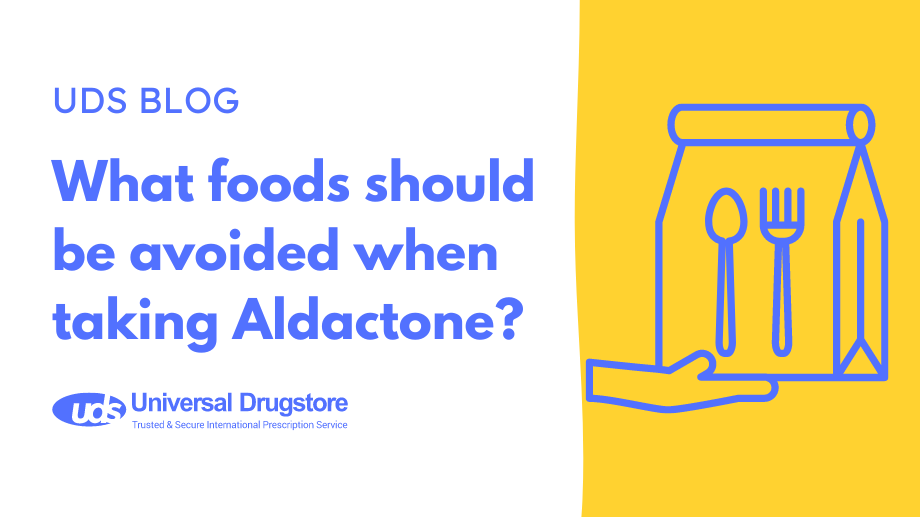Is Aldactone used for PCOS?

PCOS (polycystic ovarian syndrome) is a hormonal disorder that is estimated to affect 1 in 5 women during their reproductive years. It is one of the main causes of female infertility, affecting as many as 6% to 12% of American women. Altactone (spironolactone) is a common medication healthcare providers use in the treatment of PCOS. Here is what you need to know about PCOS and Aladoctone’s role in treating it.
Overview of PCOS
PCOS is characterized by high androgen levels (hyperandrogenism). Androgens are male sex hormones that are typically present in women in small amounts. People with PCOS often have irregular menstrual cycles, missed periods, and disrupted ovulation due to this androgen excess. Small fluid-filled sacs with immature eggs (cysts) may develop in PCOS but you do not need to have cysts on your ovaries to have this condition.
Symptoms of PCOS
Symptoms of PCOS often start around the time of the first menstrual period although they can develop later in life. Symptoms can vary but common symptoms for PCOS patients include:
- Irregular menstrual cycles: Having fewer or no menstrual periods are common signs of PCOS. So is having heavy, irregular periods or ones that last for many days or longer than is typical.
- Excess body hair: You may grow facial hair or experience excessive hair growth on your arms, chest, and stomach (hirsutism). This can affect up to 70% of people with PCOS.
- Acne: PCOS can cause oily skin or acne, especially on your face, chest, and back, which can be difficult to treat.
- Cysts: Your ovaries may be enlarged with numerous small cysts containing immature eggs visible on ultrasound. Your ovaries might not work as well as they should.
- Weight gain: Weight gain and obesity are common in PCOS. You can have trouble maintaining a healthy weight which can lead to high cholesterol and high blood pressure (hypertension).
- Insulin resistance: If you have PCOS, you will typically also have insulin resistance, meaning your body does not respond to insulin properly. Insulin levels then build up in your body and can increase ovarian androgen production. You are also at an increased risk of developing type 2 diabetes.
- Infertility: PCOS is the most common cause of infertility in women. You can have a hard time conceiving due to irregular ovulation or lack of ovulation.
- Skin tags: Little flaps of extra skin that are often found in your armpits or on your neck can occur in PCOS.
- Hair loss or thinning hair: In PCOS, you can lose patches of hair on your scalp or go bald.
- Darkened skin: You may get patches of dark skin, especially in the folds of your armpits, neck, between your legs, and under your breasts.
Causes of PCOS
The exact cause of PCOS is not known. There is evidence that genetics may play a role. Several risk factors may play a role in developing PCOS, including:
- Obesity.
- Higher levels of androgens (male sex hormones).
- Insulin resistance.
- Low-grade inflammation that causes your ovaries to produce androgens, which can lead to heart and blood vessel problems.
How does Aldactone help treat PCOS?
Aldactone is a diuretic that is considered an aldosterone receptor antagonist and anti-androgen. It is commonly used to treat conditions such as congestive heart failure, edema (swelling) due to kidney or liver dysfunction, high blood pressure, high aldosterone levels, acne in women, and excessive hair growth in women.
As an aldosterone receptor antagonist, it helps regulate your body’s electrolyte balance (sodium and potassium levels). Aldactone causes your body to get rid of sodium and water through urination, but it also helps retain potassium. This helps manage your blood pressure and prevent fluid retention.
As an anti-androgen, Aldactone can help block the effects of androgens (male sex hormones). It does this by attaching to androgen receptors, including the hair follicles preventing the hormones from binding and taking effect. It may also help prevent the production of androgen hormones in the ovaries and adrenal glands as well. By blocking these androgens, Aldactone helps relieve symptoms of PCOS.
What are the side effects of Aldactone?
As with any medication, Aldactone may cause some side effects, including:
Shop Medications
- Dizziness
- Headache
- Drowsiness
- Nausea
- Hair loss (alopecia)
- Diarrhea
- Vomiting
- Enlargement of male breasts (gynecomastia)
- Stomach cramps
- Lower sex drive
- Breast pain
- Irregular or lack of menstrual periods
- Sexual dysfunction
- Leg cramps
- Lower sodium levels
Aldactone can also cause more serious side effects, including:
- Electrolyte imbalances, including high potassium (hyperkalemia), low sodium, calcium, and magnesium
- Kidney problems
- Severe allergic reactions, although it is not known how often this side effect may have occurred in clinical trials
Disclaimer: These are not all of the possible side effects of Aldactone. You should always seek medical advice from your healthcare provider for any questions or concerns about your medical condition or treatment. Read all patient information, medication guides, or drug information sheets that come with this medication. You can also report adverse effects to the Food and Drug Administration at www.fda.gov/medwatch or 1-800-FDA-1088.
What other treatment options are there for PCOS?
Your healthcare provider will determine the appropriate treatment based on your symptoms, medical history, other health conditions, and if you want to get pregnant. Treatment options can include medications, lifestyle modifications, or a combination of both.
Medications
- Oral contraceptive pills or other hormonal birth control: Birth control pills, patches, vaginal rings, or IUDs that contain estrogen and progestin decrease androgen production and regulate estrogen. Regulating your hormone levels can regulate your menstrual cycle. Some options can help with excessive hair growth and acne.
- Glucophage (metformin): This medication is commonly used to lower blood glucose levels in people with type 2 diabetes. It can improve insulin resistance, a common issue in PCOS. By improving insulin sensitivity, metformin can help reduce androgen production and relieve symptoms of PCOS.
- Vaniqa (eflornithine): This topical cream can be used to slow down the growth of unwanted facial hair in women.
- Clomid (clomiphene): This medication may be the first treatment recommended if you have PCOS and are trying to get pregnant. Clomifene encourages the monthly release of an egg from the ovaries (ovulation).
- Femara (Letrozole): This breast cancer medication can also work to stimulate the ovaries to help with ovulation.
- Rogaine (minoxidil) or Propecia (finasteride): If you cannot use spironolactone for hair loss, these may be alternatives.
- Eulexin (flutamide): This is an anti-androgen that may be used for excessive hair growth.
- Acne treatments: Oral pills and topical creams or gels may be used to help improve acne.
Lifestyle Changes
In overweight or obese women, the symptoms and risk of developing long-term problems from PCOS can be significantly improved by losing weight. Even a weight loss of just 5% can lower blood sugar and androgen levels. It may also help with ovulation.
You can lose weight by regularly exercising and eating a healthy, balanced diet. Your diet should include plenty of fruit and vegetables, whole grains, lean meats, fish, and chicken. If you are having trouble maintaining a normal blood sugar, you may need to limit your sugar and carbohydrate intake.
Exercise can also help lower your blood sugar levels. If you have PCOS, getting regular exercise may treat or prevent insulin resistance. Talk with your healthcare provider about a diet and exercise plan that may be right for you.
Sources
- Escobar-Morreale H. F. (2018). Polycystic ovary syndrome: definition, aetiology, diagnosis and treatment. Nature Reviews. Endocrinology, 14 (5), 270–284. doi: 10.1038/nrendo.2018.24. Accessed June 11, 2024.
- PCOS: Spironolactone. Young Women’s Health. Accessed June 11, 2024.
- Spritzer PM, Lisboa KO, Mattiello S, Lhullier F. Spironolactone as a single agent for long-term therapy of hirsute patients. Clin Endocrinol (Oxf). 2000 May;52(5):587-94. doi: 10.1046/j.1365-2265.2000.00982.x. PMID: 10792338. Accessed June, 11, 2024.
- Patricia Barrionuevo, Mohammed Nabhan, Osama Altayar, Zhen Wang, Patricia J Erwin, Noor Asi, Kathryn A Martin, M Hassan Murad, Treatment Options for Hirsutism: A Systematic Review and Network Meta-Analysis, The Journal of Clinical Endocrinology & Metabolism, Volume 103, Issue 4, April 2018, Pages 1258–1264. Accessed June 11, 2024.
- Radosh L. Drug treatments for polycystic ovary syndrome. Am Fam Physician. 2009 Apr 15;79(8):671-6. PMID: 19405411. Accessed June 11, 2024.
- Spironolactone. DailyMed. Accessed June 11, 2024.





